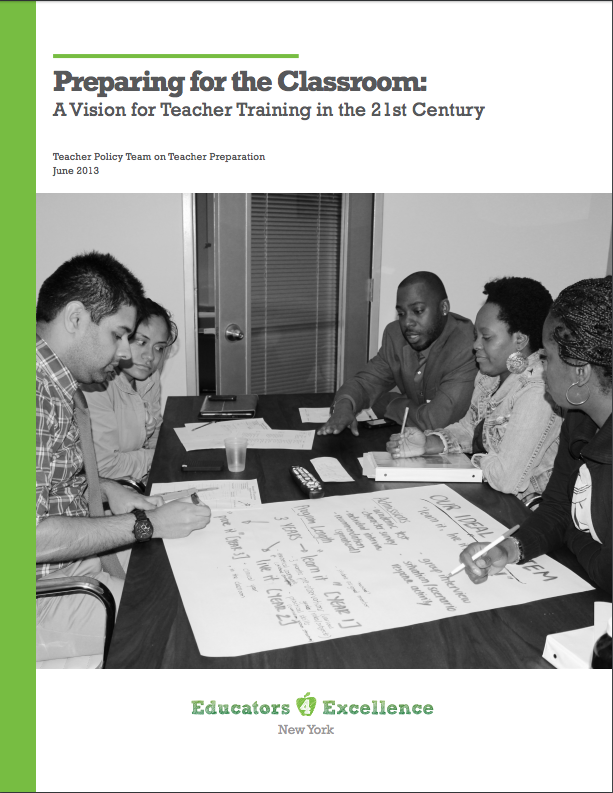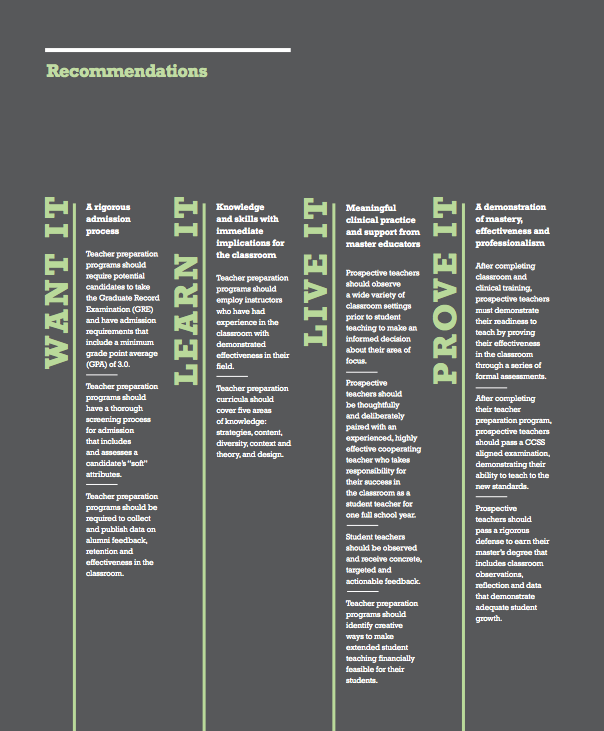Preparing for the Classroom
A Vision for Teacher Training in the 21st Century
June 2013

As classroom teachers, we know that even as our training experiences vary from traditional to alternative certification, one aspect among them is common: quality preparation is critical, yet not consistently received. Too many teachers enter the classroom feeling ill prepared for the challenges of teaching – whether those challenges are classroom management, content expertise or pedagogical strategies. Teacher preparation programs are failing to prepare us for success. According to the American Federation of Teachers, one in three new teachers do not feel prepared on their first day of teaching. Furthermore, approximately 50 percent of new teachers leave the profession within five years.
We and our peers want more rigorous and effective preparation. We call on schools of education to upgrade their programs to enable teaching candidates to want it, learn it, live it and prove it. And we call on our local and state governments to expect and demand better training and create incentives for these changes to be made.
Recommendations:
-
Raise the bar for entry into teacher preparation programs by setting GPA and GRE requirements and screen candidates for soft attributes, like organization and perseverance.
-
Collect and publish data from teacher preparation programs on alumni feedback, retention and effectiveness in the classroom.
-
Emphasize tangible and applicable classroom practices for student teachers, taught by an instructor who has demonstrated effectiveness in the classroom.
-
Pair prospective teachers with experienced, highly effective cooperating teachers for one year and have the chance to observe a wide variety of classroom settings.
- Require prospective teachers to demonstrate their readiness to teach by proving their effectiveness in the classroom through a series of formal assessments, including a standards-aligned examination.
About the Teacher Action Team
We are a team of 17 teachers who met over two months to review research on different models of teacher preparation, as well as local strategies. Additionally, we hosted conversations with leaders from New York State Department of Education, The New Teacher Project (TNTP), Teach For America, The City College of New York, Columbia University, Bank Street College of Education and other teacher preparation education experts. Our Policy Team conducted peer and administrator interviews to gather critical stakeholder feedback and surveyed 170 E4E members and nonmembers to understand the most essential strategic components of a teacher preparation program for teachers.
Joelle Andres Special Education Teacher at I.S. 285 - Meyer Levin
Mara Dajevskis 5th-grade Social Studies Teacher at P.S. 89 - Elmhurst
Kelsy Eagan 2nd-grade Teacher at P.S. 140 - Nathan Straus
Lashonda Gardenhire Middle School Social Studies Teacher at The Equity Project Charter School
Rachael Goeler Special Education Teacher at P.S. 233 at Metropolitan High School
William LaMonte High School Science Teacher at Millennium High School
Erica Millado 6th-grade Math Teacher at Innovate Manhattan Charter School
Rabin Nickens Elementary School Teacher at P.S. 290
Kristen Ritter High School Math Teacher at Facing History High School
Vailala Salazar-Gregory Special Education Teacher at P.S. 141
Rahul Sharma High School Social Justice and Technology Teacher at Bronx School for Law, Government, and Justice
Hanna Sufrin 3rd-grade Writing Teacher at Achievement First Brownsville Charter School
Kalyca Thomas 6th-grade English Language Arts Teacher at P.S. 214
Scott Wade 8th-grade English Language Arts Teacher at P.S. 29 - Melrose School
Peter Weiss 1st-grade Teacher at Achievement First Endeavor Elementary School
Dennis Yacobucci Special Education Teacher at P.S. 369 - Coy L. Cox School
Kevin Yarbrough Kindergarten Teacher at P.S. 352
